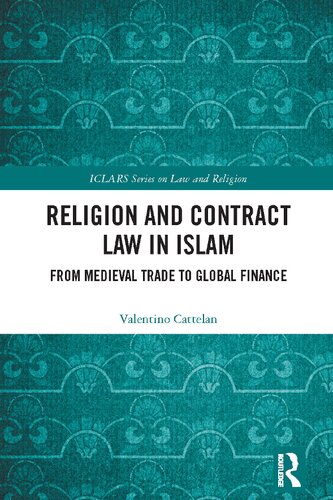

Most ebook files are in PDF format, so you can easily read them using various software such as Foxit Reader or directly on the Google Chrome browser.
Some ebook files are released by publishers in other formats such as .awz, .mobi, .epub, .fb2, etc. You may need to install specific software to read these formats on mobile/PC, such as Calibre.
Please read the tutorial at this link: https://ebookbell.com/faq
We offer FREE conversion to the popular formats you request; however, this may take some time. Therefore, right after payment, please email us, and we will try to provide the service as quickly as possible.
For some exceptional file formats or broken links (if any), please refrain from opening any disputes. Instead, email us first, and we will try to assist within a maximum of 6 hours.
EbookBell Team

4.8
94 reviewsWhat is a contract in Islam? Is it an aspect of Muslim religion or of secular
life? How much has it changed over the centuries? Undertaking a search that
spans revelation, legal tradition, and the reality of the Muslim world, this book
explores the Islamic contract (‘aqd in Arabic) as a ‘city’ at the crossroads of
convergent paths of translation, comparison, and law in context.
In particular, the book shows that only by re-orienting traditional categories
of Western law-religion toward the East can an alternative path of discovery
for the ‘aqd be advanced. Hence, through a fortuitous encounter with an Arab
Girl, the reader will (re-)visit the Temple of Western modernity and explore a
city ruled by Towers of dialectical forces, carrying a hermeneutical Ring that
combines dialectics, Islamic studies, and media theory. This interdisciplinary
approach will not only enrich our knowledge of the ‘aqd but also make it more
understandable as a cultural and social construction to which both Muslims
and non-Muslims have participated in forging its multiple representations. By
inviting the readers ‘to know who they are’ while looking at her, the Arab Girl
is already waiting for us to listen to the Islamic contract in a new way.
By applying a distinctive law and religion approach to the study of the
contract in Islam, the book provides a comprehensive exploration of a topic
that is of interest to legal and economic comparatists as well as to readers in
anthropology, Islamic and cultural studies, and it is also of topical meaning for
today’s international lawyers and the operators of an increasingly multicultural
and transnational market.